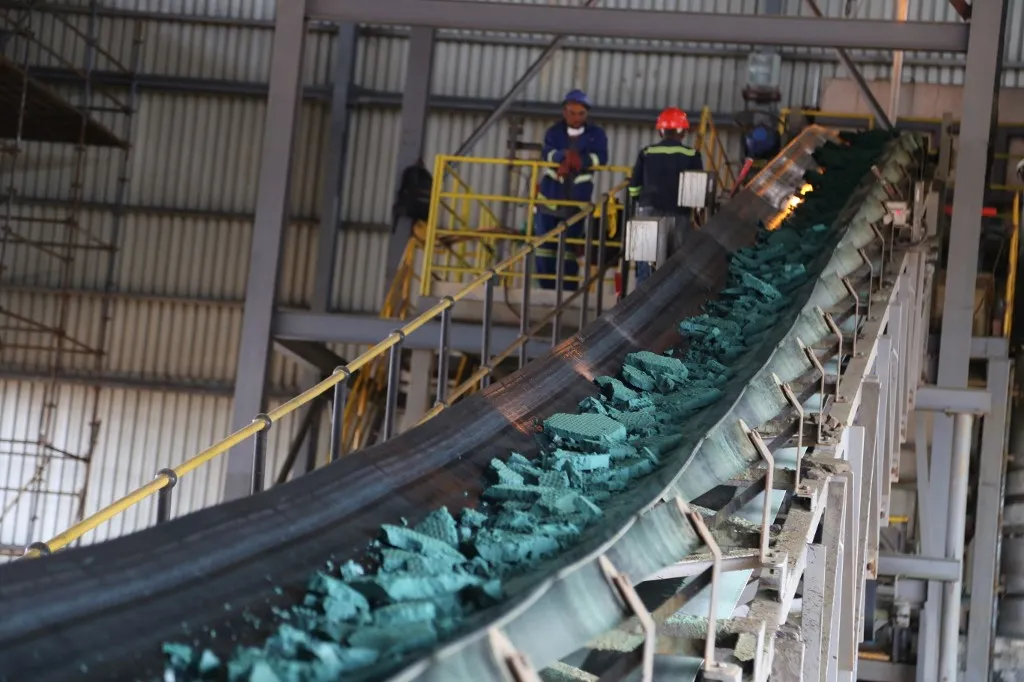Research at five of the biggest cobalt mines in the Democratic Republic of Congo has exposed widespread labour exploitation and workers’ rights abuses, according to a British NGO.
A report from RAID (Rights and Accountability in Development), The Road to Ruin? Electric vehicles and workers’ rights abuses at DR Congo’s industrial cobalt mines, cites workers who say they are subjected to excessive working hours, degrading treatment, violence, discrimination, racism, unsafe working conditions and a disregard for basic health provision.
Over 70% of the world’s cobalt, which is used in the production of lithium-ion batteries for electric vehicles and portable electronics, was mined in the DRC in 2020. Large scale industrial mines account for 80% of Congo’s cobalt exports, with 20% from artisanal miners.
The findings were based on research over 28 months by RAID and the Centre d’Aide JuridicoJudiciaire, a Congolese legal aid centre, in and around Kolwezi, a mining town where many cobalt and copper mines are located.
The research focuses on five of the world’s largest copper and cobalt mines owned or operated by multinational mining companies which together produced nearly half of the global supply of cobalt in 2020: Glencore’s Kamoto Copper Company (KCC), Eurasian Resources Group’s Metalkol RTR, China Molybdenum’s Tenke Fungurume Mining, China Nonferrous Metal Mining Company’s Société minière de Deziwa (Somidez), of which the Congolese state company Gécamines owns 49%, and Sino-congolaise des mines (Sicomines) a joint venture between Gécamines and a consortium of Chinese companies and investors.
Subcontracting conditions
RAID says that the pervasive use of subcontractors, which account for up to 57% of the 26,455 workers across the five mines, is at the heart of an abusive system. About 63% of those interviewed hired through subcontractors earn extremely low wages, often much less than the local living wage of $402 a month calculated by RAID.
“Rather than employing workers directly, the mining companies turn to subcontracting firms to provide large parts of their workforce, from miners to cleaners, to drivers, to security personnel and others. Workers and managers from subcontracting firms we interviewed said they believed companies use this model as an intentional strategy to reduce costs, limit liability for workers’ safety and prevent workers from joining unions,” the report says.
“Workers described being treated as second-class citizens, with those directly employed earning pay and benefits far superior to their own low pay, with the principle of equal pay for equal work routinely violated. Many said they were in despair, unable to pull themselves or their families out of poverty.”
In their responses to the report, only Glencore, the owner of KCC, said it had acted to suspend some of its subcontractors due to safety or non-performance, the report says.
Discrimination at Chinese mines
Workers at Chinese-owned mines have been subjected to discrimination, says the report. At Sicomines, Somidez, TFM, and their respective subcontractors, as well as at Metalkol’s subcontractors, workers reported either experiencing or witnessing racism and discrimination almost daily, expressed through physical violence and verbal abuse.
“Workers described a “colonial era” level of discrimination – being kicked, slapped, beaten with sticks, insulted, shouted at, or sometimes pulled around by their ear, when they were not able to understand instructions in Mandarin, made errors or refused to undertake dangerous tasks. In most cases, those who countered this treatment were immediately dismissed without pay,” says the report.
While only workers employed by Chinese-owned mining companies and subcontractors expressed witnessing or suffering blatant racism and violent abuse, other forms of discrimination have been reported at non-Chinese mines, including preferential treatment and facilities for expatriates.
The DRC Labour Inspectorate, which is responsible for ensuring the well-being of workers, has just two inspectors in the Kolwezi district, according to the report. RAID recommends that firms hire the majority of their Congolese workforce directly and limit outsourcing to workers with specialised skills for a limited period of time, as well as reviewing all contracts with subcontractors.
With cobalt increasingly in demand as the global green energy transition gathers pace, manufacturers will need to ensure that the supply chain is free of abuse, the authors write.
“Electric vehicles and rechargeable batteries are an integral part of the clean energy transition. As electric vehicles and battery manufacturers move to the forefront of the market, they will need to implement stronger measures to ensure the cobalt they use is free from abusive labour conditions.”
Want to continue reading? Subscribe today.
You've read all your free articles for this month! Subscribe now to enjoy full access to our content.
Digital Monthly
£8.00 / month
Receive full unlimited access to our articles, opinions, podcasts and more.
Digital Yearly
£70.00 / year
Our best value offer - save £26 and gain access to all of our digital content for an entire year!
 Sign in with Google
Sign in with Google 



